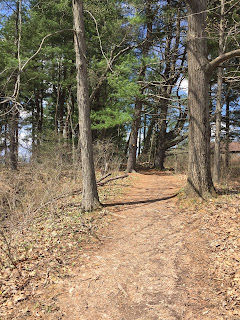I just finished reading
Meet the Frugalwoods: Achieving Financial Independence Through Simple Living by Elizabeth Willard Thames. This book is about how Liz, as she is familiarly known, and her husband Nate, saved up and “retired” to a 69 acre homestead in rural Vermont at the ripe old age of 32.
After surviving a temp job as bad as
some of my temp jobs she went to work in New York City through Americorps, which paid a $10,000 stipend. With the aid of $120 a month in food stamps and a free subway pass, Liz was able to
save $2,000 that year! Mind you, this was only about 10 years ago.
When they were first married, and both working good paying jobs, they started experiencing what Liz calls “lifestyle creep” - frequent dinners out, going to expensive coffee shops, and $120 haircuts. Yet they didn’t feel any happier.
At the time, they were living in a tiny basement apartment and going to open houses every weekend. Home prices being so high in the Boston area, they hatched a plan to start living frugally and focused on saving for a house. They went to hundreds of open houses. One day, they purposely drove to a potential home in the Boston suburbs during rush hour. While sitting in traffic, they wondered “what’s the point of buying more house and more yard if we’re never there to enjoy it?”
Long story short, they bought a house in Cambridge, and then applied the same intensive frugality to save up for their homestead. They still own the Cambridge house; it’s a rental property bringing in passive income.
l checked out her blog
frugalwoods.com which is awesome. Their two little girls are adorable. I left a comment on her blog complimenting the photography; it’s that good.
Did you notice how I put “retired” in quotes above. Liz is making a lot of money from her blog and book, and Nate still works, telecommuting from home, and according to public record, earning over $250,000 a year. Frugality alone doesn’t support their lifestyle.
That being said, I was impressed by the extremes that Liz went to, such as eliminating dining out, coffee shops, new clothing, haircuts, and even eschewing makeup. The couple replaced expensive outings with free concerts and hiking. Liz bartered working at her yoga studio’s front desk for free yoga classes.
The couple’s focus and ability to stick with their plan and meet their goals makes for a good read. I like how they saved up for a purpose - House! Homestead! - and
not solely to have money sitting in a bank account.
Could I have done that twenty years ago? Some things yes and some things no. As for the yes, I firmly believe that eating at restaurants all the time or coffee out daily becomes tedious (others may disagree); rather, going out less frequently increases my enjoyment when I do go. We do our own yard work, try to use coupons, and save when we can.
On the other hand, will I quit wearing makeup, wear used clothes, volunteer at the Y for free membership, or let my husband cut my hair? Emphatic No!
I still think the book and the blog are well written, enjoyable to read, and can be the inspiration to think more about how you spend your money.
 |
| Checked out from the library, of course |




















